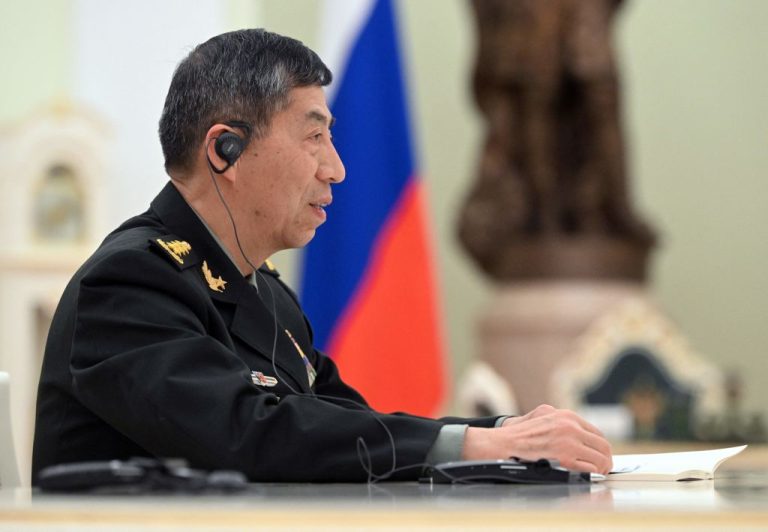A spokesperson for the People’s Republic of China (PRC) embassy in Washington told reporters on June 28 that if the Biden administration wants to have formal talks between the two countries’ armies, then sanctions have to be lifted as a condition.
Liu Pengyu told reporters during a press conference, “The US side knows the reason for difficulties in its military-to-military relations with China — it actually imposed unilateral sanctions on China,” as reported by Bloomberg.
He added, “Such obstacles should be removed before any exchange and cooperation could take place between the two countries.”
The conflict is a likely reference to a unique case where the current Minister of Defence for the Chinese regime — Li Shangfu, is currently saddled with a set of sanctions applied in 2018 during the Trump administration in connection to the People’s Liberation Army (PLA) purchasing weaponry from the Russian Federation.
The PLA is the armed wing of the Chinese Communist Party (CCP).
Success
You are now signed up for our newsletter
Success
Check your email to complete sign up
Reporting at the time on the sanctions by CNN stated they were an automatic result of existing U.S. law: “The penalties were applied under a law that requires the US to sanction anyone undertaking significant transactions with certain people affiliated with Russian intelligence and military services, including arms manufacturers.”
Then-Secretary of State Mike Pompeo added 33 Russians to the blacklist at about the same time.
For Beijing, the issue is likely a result of a loss of face stemming from the fact that Li’s sanctions have not been removed after his appointment in March following Xi Jinping’s confirmation of a third term as Chinese leader.
Bloomberg reported in May that a spokesperson for the State Department openly stated the sanctions wouldn’t be removed after Xi’s administration declined to meet with Secretary of Defense Lloyd Austin.
Biden told reporters at the time, however, that the sanctions were “under negotiation right now.”
In March, around the time that Li was appointed, VOA reported that the State Department’s position was somewhat tone deaf when a spokesperson commented that sanctions “do not necessarily prohibit sanctioned persons from meeting with U.S. government officials.”
Even on the diplomatic side, one step forward has been met with two steps back for the reigning Washington.
After Secretary of State Antony Blinken traveled to Beijing to meet directly with Xi in mid-June — Biden told reporters the state secretary “did a hell of a job,” and that relations between the two governments could be described as “on the right trail here.”
However, just days later at a fundraising event in California for his 2024 reelection campaign, Biden told an audience which included Governor Gavin Newsom that his counterpart in China was a “dictator” whose subordinates did not inform him of the Chinese spy balloon scandal.
When asked about his comments during a following event with Indian President Narendra Modi, Biden said, “I expect to be meeting with President Xi sometime in the future, near-term. And I don’t think it’s had any real consequence.”
In a June 26 “explainer” on what Reuters calls a “chill” between China and America’s militaries, the wire service notes that not only Li, but other “senior officials” in the Xi administration want “signs” of “mutual respect” from Biden’s staffers before allowing for good relationships.
Reuters cited a specific portion of an annual report on China from the Pentagon that stated China’s officials “have been reluctant to engage on nuclear, cyberspace, and space issues as it pertains to strategic risk reduction in official or unofficial dialogue, particularly in defence channels.”
Recent months have seen U.S. and other Western officials talk about “de-risking” from mainland China.
The theme permeated a recent meeting between newly appointed Premier Li Qiang and NATO member Germany’s Chancellor Olaf Scholz, where Scholz told reporters during a presser that while the G7 “has no interest in impeding China’s economic rise…at the same time we are looking closely to avoid dangerous economic dependencies.”
On June 27, a new batch of “de-risking” measures was given a litmus test in U.S. media after The Wall Street Journal reported, based on unidentified sources in the government, that Washington would soon ban the sale of all chips sold by NVIDIA to mainland Chinese entities in an effort to handicap China’s artificial intelligence industry.
The ban would likely extend to the sale and renting of cloud service computing as well, the article added.
















